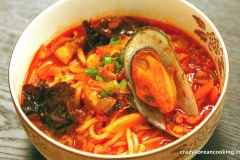Bamboo Shoot 죽순

Bamboo Shoot 죽순 [jook-soon] Bamboo shoots are edible young shoots harvested within two weeks of being planted. With their unique texture and shape, they are popular and often used in Asian dishes, including Korean. The ivory-colored shoots are known for their unique combination of crispiness and tenderness. They are mild and sweet, much like baby corn. Bamboo shoots are typically used in dishes such as champong, udon and many vegetable stir fry dishes. They contain lots of fiber which helps to lower cholesterol and regulate digestion. The potassium they provide helps to lower blood pressure. Also, a beneficial phytochemical in bamboo shoots, called lignans, appears to be antifungal and antiviral, as well as containing anti-cancer properties. Bamboo shoots are sold in fresh, dried and canned versions.
Buy Korean ingredients online here.
Sourcing & Selecting
Canned bamboos shoots are pre-cooked and need only to be heated. Fresh bamboo shoots must be cooked before eating, as raw shoots are bitter and the texture is hard to digest. The outer leaves are tough and will not be edible regardless of being cooked, thus they should be removed prior to cooking. Do not worry,they will retain their crispiess after cooking. | |
Trim the roots and peel outer layers of leaves and tough parts. |
|
Cook them in uncovered boiling water for about 20 mins. |
Value per 100g
Proximates
Water g 91
Energy kcal 27
Protein g 2.6
Total lipid (fat) g 0.3
Carbohydrate, by difference g 5.2
Fiber, total dietary g 2.2
Sugars, total g 3
Minerals
Calcium, Ca mg 13
Iron, Fe mg 0.5
Magnesium, Mg mg 3
Phosphorus, P mg 59
Potassium, K mg 533
Sodium, Na mg 4
Zinc, Zn mg 1.1
Vitamins
Vitamin C, total ascorbic acid mg 4
Thiamin mg 0.15
Riboflavin mg 0.07
Niacin mg 0.6
Vitamin B-6 mg 0.24
Folate, DFE µg 7
Vitamin B-12 µg 0
Vitamin A, RAE µg 1
Vitamin A, IU IU 20
Vitamin E (alpha-tocopherol) mg 1
Vitamin D (D2 + D3) µg 0
Vitamin D IU 0
Vitamin K (phylloquinone) µg 0
Lipids
Fatty acids, total saturated g 0.069
Fatty acids, total monounsaturated g 0.007
Fatty acids, total polyunsaturated g 0.134
Cholesterol mg 0
Other
Caffeine mg 0












